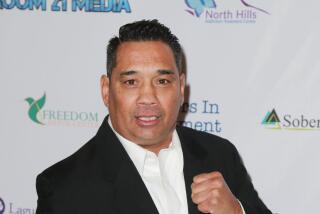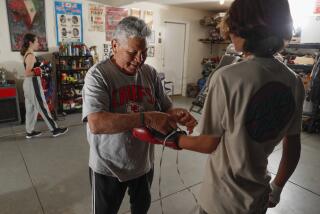There’s No Limit to What This Punishment May Mean
- Share via
Question: The Nevada State Athletic Commission unanimously voted to revoke Tyson’s boxing license, instead of suspending him. What’s the difference between a suspension and a revocation?
Answer: Basically, a suspension is punishment for a set amount of time, whether it’s six months, a year or more. A revocation is indefinite, based upon the commission’s discretion.
Said Don Haight, legal counsel for the commission: “A suspension means the taking away of a license for a limited period of time. Suspend means the license still exists. Revoke means the license ceases to exist, and without further action will never be restored.”
Also, the maximum allowable fine for a suspension is $250,000. The maximum allowable fine for a revocation in Nevada, pending future legislation, is 10% of the purse, or, in Tyson’s case, $3 million.
Q: Where will that $3 million go?
A: By Nevada law, to the state’s general fund.
Q: What is the process for reinstatement?
A: One calendar year after the revocation order is signed by commission chairman Elias Ghanem, Tyson will be allowed to reapply for a boxing license. Once the commission receives the application, it must put the matter on the agenda for an upcoming meeting or schedule an emergency hearing within a few weeks of receiving the application.
At the hearing, the commissioners would hear presentations, then take a vote, with the majority vote deciding.
Q: Could Tyson fight in another state or nation during the Nevada ban?
A: At least 45 states honor any disciplinary order by Nevada, and those that officially do not are not likely to stage a bout. Tyson could try to fight in another country, but he is under probation for his rape conviction until 1999 and must receive permission from his parole officer and Judge Patricia Gifford before traveling across the U.S. border.
If Tyson does avoid the Nevada ban and fights elsewhere, it is likely he would never be licensed in Nevada again.
Q: Who would sanction such a fight?
A: Sanctioning bodies such as the World Boxing Assn., which sanctioned Tyson-Holyfield II, or the World Boxing Council have authority only over their own title fights and are not considered regulating bodies. If Tyson chose to fight in another country, unless it is for a major title (which is unlikely), the main controlling body would be designated by the government involved.
Q: If he does fight during the revocation period, would his opponent or anyone else involved be subject for discipline? By whom?
A: The Nevada commission explicitly stated Wednesday that any fighters, managers or promoters licensed by the state are prohibited from becoming involved in a Mike Tyson fight while his license is revoked in Nevada.
Ignoring the prohibition would draw disciplinary action from Nevada against any such fighter, manager or promoter, which would almost certainly be honored by all but a handful of states.
For instance, if Tyson’s promoter, Don King, promotes a Tyson fight in another country, his license probably would be revoked or suspended by Nevada.
Q: What is the precedent for a fighter attempting reinstatement after his license has been revoked?
A: According to commission attorneys, in Nevada, there is no precedent.
Q: Tyson’s fate will be decided on a year-by-year basis by the commission. When are each of the current members’ three-year terms set to expire?
A: Chairman Elias Ghanem expires Nov. 1998; Nat Carasali, Nov. 1997; Lorenzo Fertitta, Nov. 1999; Luther Mack, Nov. 1998; Jim Nave, Nov. 1999. Appointments are made by the governor and commissioners can be reappointed for multiple terms.
More to Read
Go beyond the scoreboard
Get the latest on L.A.'s teams in the daily Sports Report newsletter.
You may occasionally receive promotional content from the Los Angeles Times.










